Updated 12/15/2023
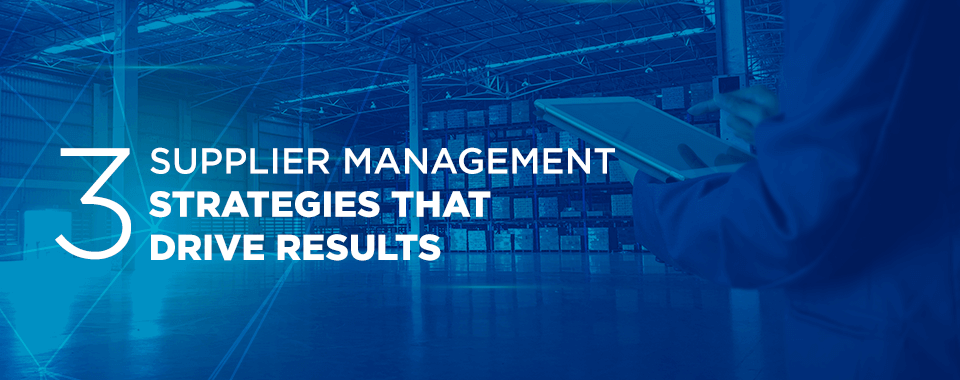
The modern-day supply chain consists of many suppliers distributed all over the world. Effective supplier chain management adds value to your operations by increasing efficiency, mitigating risks and ensuring more quality products are delivered within deadline specifications.
Supplier management and development strategies must adjust as the market continues to evolve. With proven methodology and systematic procedures, you can lead suppliers toward a culture of continuous improvement and zero defects.
What Is Supplier Management?
Supplier management is a critical part of the manufacturing process that optimizes your relationship with suppliers to maximize their value to your organization. It typically involves identifying, selecting, onboarding, engaging and managing the most suitable suppliers for your business. You’ll want to evaluate their performance regularly to ensure they continuously provide value and comply with your contract.
Effective supplier management fuels long-lasting strategic supplier relationships and quality assurance to cut costs, reduce defects and manage risks. It is also critical to implement a continuous improvement philosophy throughout the supply chain, eliminate problems and adhere to compliance requirements. You can also leverage supplier management to decrease the number of suppliers you work with and streamline your purchasing process.
The primary object of supplier management is to align the organization’s strategic objectives with the interests of other stakeholders in the supply chain. Other functions of supplier management can include:
- Establish policies for a supplier management and sourcing strategy.
- Development of proper contract flow-downs.
- Use proactive supplier surveillance to ensure suppliers produce goods and render services as expected.
- Proactive supplier development of critical processes.
- Use and adhere to approved vendor lists, including the approved special supplier processes from the National Aerospace and Defense Contractors Accreditation Program (NADCAP).
- Set targets and goals for suppliers that align with and contribute to targets set by the quality and purchasing organization.
- Monitor, measure and analyze supplier performance against established performance metrics.
- Providing routine feedback to the supplier on their quality and delivery performance.
- Keep up-to-date supplier records and information.
- Manage and develop relationships with suppliers and their tiers to improve supplier performance.
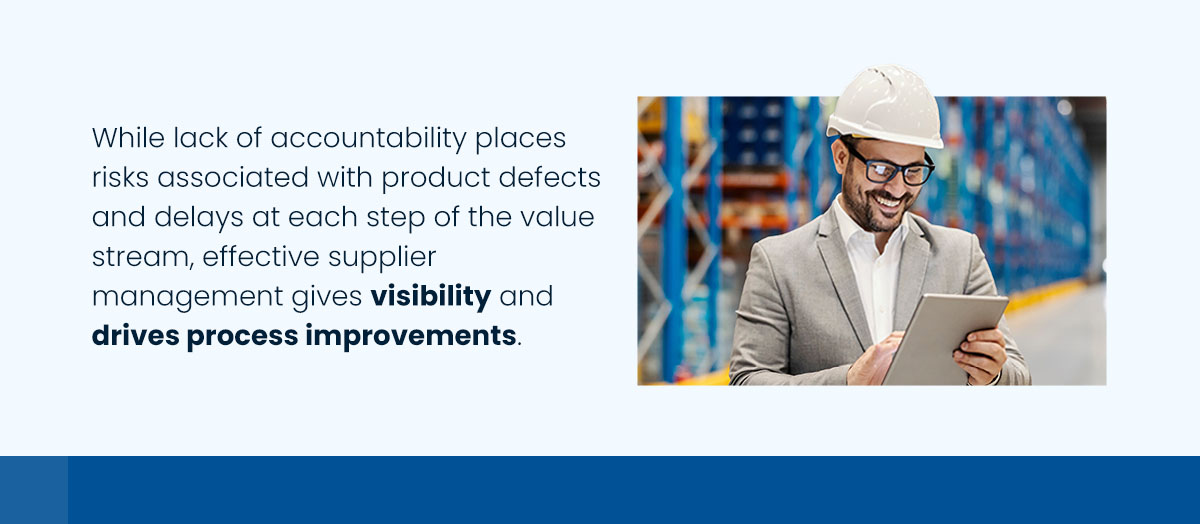
Well-defined and executed supplier management strategies increase predictability and improve supplier performance. They ensure the customer receives high-quality goods on time. While lack of accountability places risks associated with product defects and delays at each step of the value stream, effective supplier management gives visibility and drives process improvements. Effective supplier management works to identify and mitigate sources of risk throughout the supply base.
Why Is Effective Supplier Management Important?
Globalization of supply chains has allowed organizations to expand their supplier base. If you work with international companies, you need an efficient supplier management process to gain a competitive advantage, reduce costs for sourcing products and maximize the value of your supplier relationships. You can also use this process to increase your business bottom line since much of a company’s value can rely on the strength of its supplier relationships.
Traditional supplier relationships and processes have followed a quality control (QC) methodology. Finished products are inspected at receiving for defects, and any nonconforming items are then disposed of for scrap or rework. The number and types of discrepancies are unpredictable, leading to unexpected delays throughout the supply chain.
In today’s market, responding to supplier defects isn’t enough. You need a way to prevent them before they occur. The answer lies in supplier management and the production part approval process (PPAP), which uses performance metrics and process control to help suppliers eliminate defects.
Supplier management can improve quality assurance, reduce costs and drive operational efficiency throughout the supply chain. Supplier management can benefit your organization in numerous ways when you dedicate sufficient time and resources to the process. Some of these benefits include:
- Cost reduction: Effective supplier management reduces costs associated with acquiring, negotiating deals with and maintaining new suppliers.
- Improved efficiency: It increases the efficiency of manufacturing operations by ensuring fewer disruptions and out-of-station work due to supplier defects.
- Enhanced product quality: It helps you meet quality standards and decreases mistakes and costs associated with scrap, rework and repairs.
- Build stronger relationships with suppliers: Stronger relationships enhance the feedback process and mean your suppliers understand your needs. You can resolve any issues that arise quickly and seamlessly to ensure the highest levels of customer service.
A case study from an NTS Unitek aerospace client revealed that improvements to supplier quality management processes led to measurable results, such as:
- 20% increase in the number of suppliers who reached a 100% quality rating or zero defects.
- 68% decrease in supplier escapes.
- 69% decrease in unplanned scrap, rework and repair costs and hours on the aircraft production line.
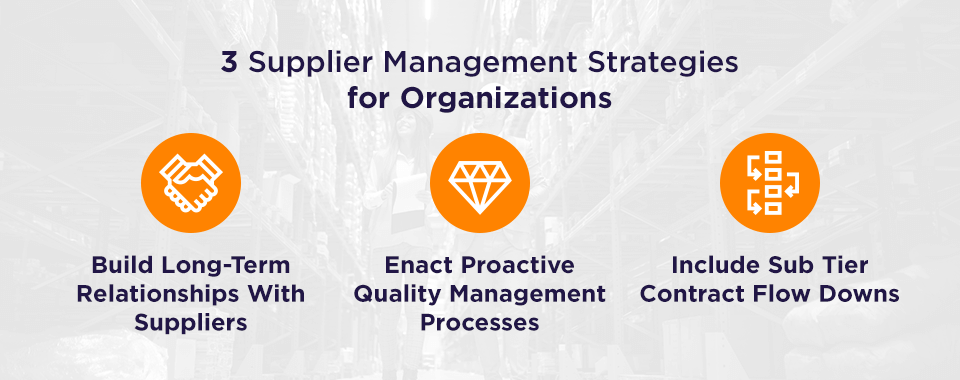
3 Supplier Management Strategies for Organizations
While there are many approaches to supplier management, these three strategies are proven to minimize risks throughout the supply chain and help you build strong relationships with your suppliers.
1. Build Long-Term Relationships With Suppliers
Historically, decreases in demand within the aerospace and defense industries have often caused suppliers to shift their capacity to other sectors. When demand eventually increases, that reduced capacity leads to longer lead times and other issues within the supply chain. Organizations must maintain supplier relationships that can withstand changes in the market to prevent depletion of resources, capability, capacity and reduced quality over time.
Here are supplier relationship management strategies you can take as a customer:
- Ensure predictable budgets: Cutting back on spending with suppliers will shift subcontractor attention to other sectors. While it’s not always possible, more consistency in your production volume with suppliers ensures these relationships stay intact over the long term.
- Plan, Do, Check, Act: Develop your Supplier Management plan and evaluate it for its effectiveness. Engage your supply base and report their performance to them consistently. A monthly scorecard helps you give direct feedback to your suppliers on their quality and delivery performance. Based on their performance data, determine what areas they need to improve through supplier development.
- Proper planning and adequate lead times: Proper production planning and good communication ensure the suppliers’ production is aligned with your own. If changes do occur to planning, the more time suppliers have to respond to requests, the more likely they are to meet deadlines. Include suppliers in your discussions of projected needs and let them know when program plans and production requirements change.
2. Enact Proactive Quality Management Processes
Reactive quality control includes practices such as final product inspections, documentation of problems and corrective actions. These procedures react to errors and manage the results of process variability. Proactive supplier quality management seeks instead to reduce the opportunities for issues.
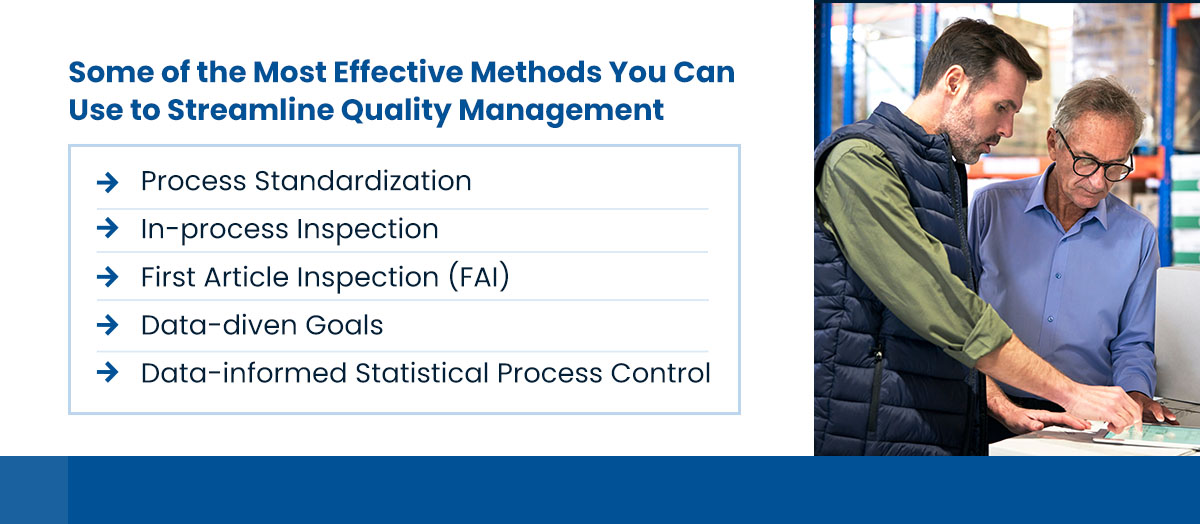
Here are some of the most effective methods you can use to streamline quality management, including:
- Process standardization: Define procedures and train personnel to follow them appropriately. Ensure systems align with engineer and design specifications and provide visual aids to clarify work sequences.
- In-process inspection: Insert inspection points throughout the manufacturing process as early as is reasonable. Use historical data to decide on critical inspection points and frequency of inspections.
- First Article Inspection (FAI): Inspect the essential attributes of the first finished items produced from a new design or after a significant change in process. In the aerospace sector, use the Aerospace Standard 9102 First Article Report Form.
- Data-driven goals: Use data-driven objectives for the plant and personnel evaluation to drive continuous improvement. Goals such as 100% quality or defects under a specified percentage drive accountability and enhancements.
- Data-informed statistical process control: Use big data and predictive analytics tools to detect and manage variation, changes and inefficiencies. Statistical studies can help you discover patterns and determine the factors that affect key quality outcomes. In manufacturing, real-time data from sensors and historical data make up most big data. Statistical programs integrating technology such as artificial intelligence (AI), machine learning (ML) and data mining help create actionable knowledge to drive better decision-making and improve quality.
3. Include Sub Tier Contract Flow-Downs
You can encourage accountability at all tiers of the supply chain by including the right flow-downs in contract language. Contract flow-downs are legally binding clauses that hold sub tiers to the same customer requirements established by the end customer contract. Your contract might contain non-negotiable flow-downs required of all subcontractors if you’re a contracted manufacturer for another purchasing organization. In this case, these flow-downs must be included in all contracts with your suppliers.
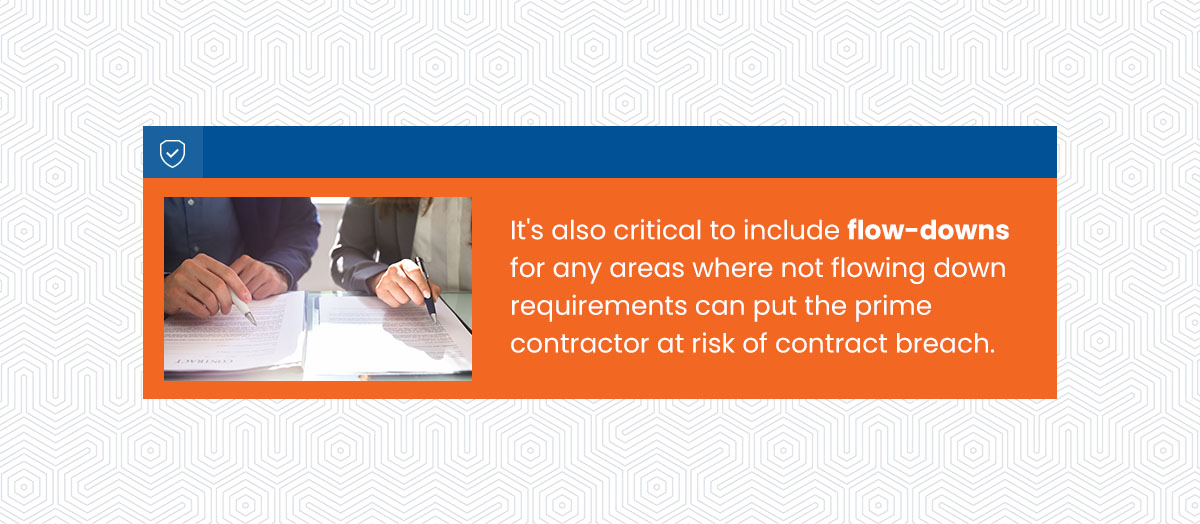
It’s also critical to include flow-downs for any areas where not flowing down requirements can put the prime contractor at risk of contract breach. By making these requirements clear within the language of the contract, all parties at every supply chain tier can remain accountable for following end-customer specifications. Flow-downs should also include an approved vendor and product list since any variations in procurement can result in product defects and contract non-compliance.
In the aerospace and defense industry, your contracts should also include language on special procedure approval processes. Flow-downs must have specific language from NADCAP.
Flow-downs should also include terms concerning the incorporation of the Production Part Approval Process (PPAP) on new product development. These procedures contribute to process control and are used by manufacturers and suppliers to communicate and get customer approval before beginning production.
Supplier Improvement Services From NTS Unitek
NTS Unitek’s supplier development procedures are based on proven strategies to manage and improve supplier performance. Our services take a strategic, methodical and analytical approach to improve supplier relationships, cut costs and reduce risks associated with supplier defects. The NTS Unitek Supplier Development team can support the development of Standard Operating Procedures (SOPs), perform root cause and process gap analysis, monitor operations in real-time and train personnel.
A complex supply chain needs a comprehensive approach to supplier improvement activities to ensure products comply with quality standards and arrive on time. Our services are geared toward quality-critical industries in the aerospace, defense, medical energy and transportation sectors. With more predictability, saved time and reduced costs from suppliers, you can focus on your core competencies.
NTS Unitek can simplify the supply chain quality process and gear it towards a trajectory of continuous improvement. Learn about our complete range of supplier development services.
Partner With NTS Unitek for Supplier Development
NTS Unitek has over 50 years of experience in supplier risk management and driving process improvements with suppliers. During this time, we’ve worked with original equipment manufacturers (OEMs) and other companies in the aerospace and defense industries to reduce business risk and increase value. Our proactive approach helps suppliers prevent and stop defects before they occur through process monitoring, corrective action planning and implementation, test engineering, error-proofing and similar services.
Contact us to learn more about our supply chain quality services.

